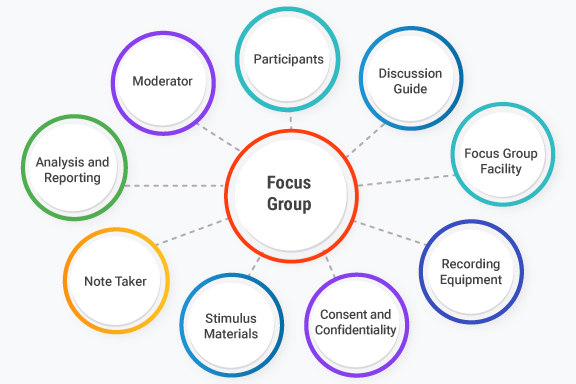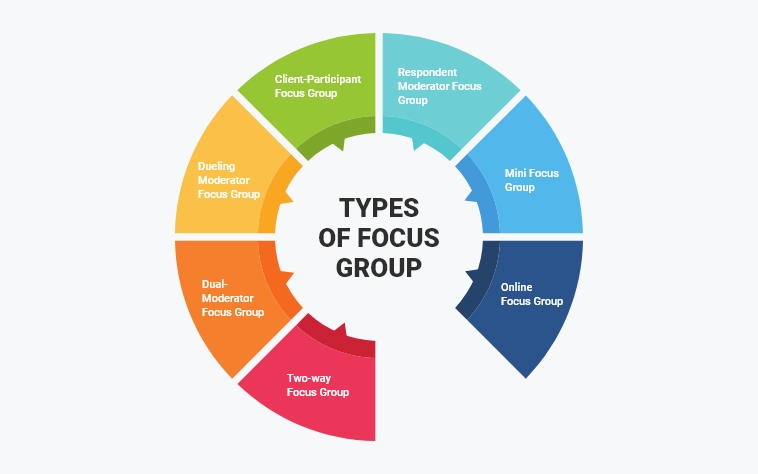What is Focus Group
A focus group is a qualitative research method where a selected group of individuals representing the target audience is brought together for discussions, opinions, and feedback gathering regarding a product, service, or concept.
Take your research to the next level with Focus Groups
Focus Groups— a powerful methodology that transcends traditional research, fostering dynamic collaboration and yielding profound insights. In this comprehensive exploration, we delve into the intricacies of the process, emphasize its importance, unveil the tangible benefits, and outline effective strategies to maximize the potential of Focus Groups.
Process Overview
Focus Groups are a qualitative research technique where a diverse group of participants is brought together to share their thoughts, feelings, and perceptions about a specific topic. Unlike surveys or individual interviews, Focus Groups thrive on interactive discussions, generating rich, contextual insights.
The Power of Focus Groups in Shaping Success
In the dynamic landscape of business and product development, understanding the needs, preferences, and sentiments of your target audience is paramount. While data analytics and surveys provide valuable quantitative insights, there is a unique and irreplaceable value in the qualitative depth that focus groups offer. Let’s delve into the world of focus groups, exploring their significance, sample use cases, and real-world case studies that underscore their pivotal role in shaping success.
Understanding the Essence of Focus Groups
What are Focus Groups?
Focus groups are structured discussions where a group of participants, carefully selected to represent a target demographic, share their thoughts, opinions, and experiences about a specific product, service, or concept. This qualitative research method fosters open dialogue and provides rich insights into the emotional and subjective aspects of consumer behavior.
Why Opt for Focus Groups?
- In-Depth Insights: Unlike quantitative data that focuses on numbers, focus groups uncover the “why” behind consumer decisions. They reveal the nuances, emotions, and motivations that drive behavior.
- Real-time Interaction: The dynamic nature of focus groups allows participants to bounce ideas off each other, sparking new perspectives and revealing group dynamics that might not emerge in one-on-one interviews.
- Iterative Development: Early-stage feedback from focus groups aids in refining prototypes and concepts before substantial investments are made. This iterative approach minimizes the risk of launching products or services that miss the mark.
- Uncovering Unconscious Insights: Participants often express subconscious opinions that might not be apparent through traditional surveys. Focus groups can unveil hidden attitudes and perceptions.
Unlocking Opportunities Through Focus Groups
- Product Development and Innovation: Imagine a tech company poised to launch a groundbreaking device. By convening a focus group of potential users, they can gauge initial reactions, identify features that resonate, and discover pain points that might have been overlooked. This iterative feedback loop ensures that the final product aligns closely with user expectations.
- Branding and Messaging Strategy: For a company rebranding or launching a new marketing campaign, focus groups become invaluable. They provide insights into how target audiences perceive brand messaging, helping to refine communication strategies and ensure alignment with brand values.
- User Experience Enhancement: Mobile app developers often leverage focus groups to enhance user experience. By observing participants interact with prototypes, developers gain real-time insights into navigation challenges, feature preferences, and overall user satisfaction.
- Understanding Market Trends: In the fast-paced world of fashion, focus groups can help designers stay ahead of trends. By gathering a diverse group of fashion enthusiasts, designers can gain insights into emerging styles, colors, and preferences that might influence their upcoming collections.
Case Studies: Illuminating Success Stories
Procter & Gamble’s Diaper Revolution: In the 1970s, P&G faced a challenge with its diaper product. Focus groups were convened to understand the concerns of parents, leading to the development of Pampers. This revolutionized the diaper industry, as Pampers addressed issues raised in the focus groups, such as leakage and discomfort.
Apple’s iPhone Evolution: Before the launch of the iPhone, Apple conducted extensive focus groups to understand user expectations. Insights from these sessions influenced the device’s design, functionality, and user interface. The success of the iPhone can be attributed, in part, to Apple’s commitment to understanding user needs through focus groups.
Dove’s Real Beauty Campaign: Dove’s Real Beauty campaign aimed to challenge beauty stereotypes. Focus groups played a pivotal role in shaping the campaign’s message and ensuring it resonated with its target audience. By understanding diverse perspectives on beauty, Dove successfully shifted the narrative and established a powerful connection with consumers.
Navigating Challenges: Maximizing the Impact of Focus Groups
While focus groups offer unparalleled insights, they are not without challenges. It’s essential to approach them with a strategic mindset:
Diverse Representation: Ensure your focus group represents the diversity of your target audience. This includes factors such as age, gender, socioeconomic status, and cultural background.
Skilled Moderation: A skilled moderator is crucial to guide discussions, extract meaningful insights, and maintain a balanced conversation. They must foster an environment where participants feel comfortable expressing their opinions.
Analyzing Qualitative Data: Analyzing qualitative data can be complex. Utilize both quantitative and qualitative methods to validate findings and extract actionable insights.
Iterative Approach: Use focus groups iteratively throughout the development process. Early-stage insights can inform prototypes, while later stages can focus on refining and optimizing based on user feedback.
Nurturing Success Through Insightful Dialogues
In the ever-evolving landscape of business, understanding the heartbeat of your audience is non-negotiable. Focus groups stand as beacons of qualitative exploration, providing a window into the minds of your consumers and guiding your decisions towards success.
Through real-world case studies and sample use cases, we’ve witnessed the transformative power of focus groups in shaping products, campaigns, and brand narratives. As businesses navigate the complex web of consumer expectations, integrating focus groups into their research arsenal becomes a strategic imperative — a pathway to unlocking insights that propel them ahead in the pursuit of excellence.

Importance
Dynamic Interaction
The heart of Focus Groups lies in the dynamic interaction among participants. The exchange of ideas and the diversity of perspectives create a tapestry of insights that goes beyond individual opinions.
Contextual Exploration
Focus Groups provide a unique opportunity to explore topics in a contextual setting. Participants’ responses are not limited to predetermined questions; they can elaborate, challenge, and build upon each other’s thoughts, leading to a deeper understanding.
Real-Time Feedback
Unlike other research methods, Focus Groups offer real-time feedback. Observers can witness participants’ reactions, body language, and facial expressions, gaining nuanced insights that might be missed in post-event analysis.


Your Business Benefits
Rich Qualitative Data
Focus Groups yield rich qualitative data. The depth and context provided by participants’ responses offer a nuanced understanding of attitudes, perceptions, and motivations surrounding the discussed topic.
Idea Generation
The collaborative nature of Focus Groups sparks idea generation. Participants bounce ideas off each other, fostering creativity and often leading to innovative solutions or perspectives that might not emerge in individual settings.
Enhanced Participant Engagement
Participants in Focus Groups are actively engaged. The social setting encourages openness, and individuals feel more comfortable expressing their thoughts, contributing to a more comprehensive and authentic dataset.
Your Business Strategies
Thoughtful Participant Selection
Selecting the right participants is crucial. Ensure diversity in demographics and backgrounds to capture a broad spectrum of perspectives. Thoughtful recruitment lays the foundation for a robust and representative Focus Group.
Skilled Moderation
A skilled moderator is the linchpin of a successful Focus Group. Their ability to guide discussions, probe for deeper insights, and manage the group dynamics ensures the session stays focused and productive.
Balancing Group Dynamics
Focus Groups require a delicate balance of group dynamics. A skilled moderator ensures that no single voice dominates the discussion, creating an environment where all participants feel comfortable expressing their views.

